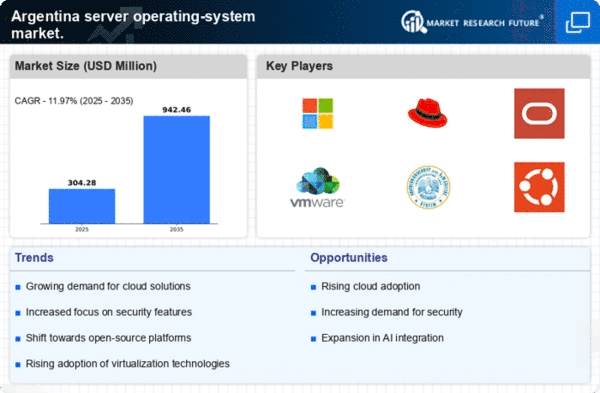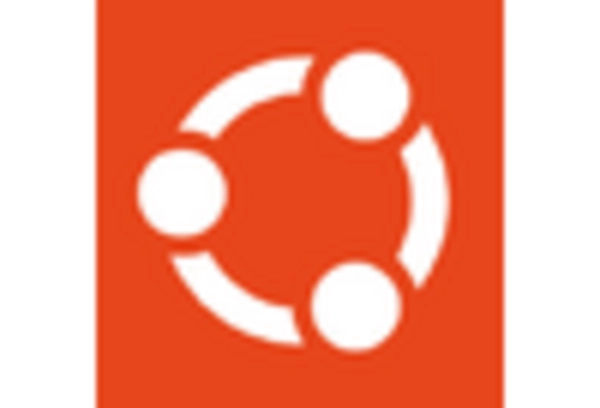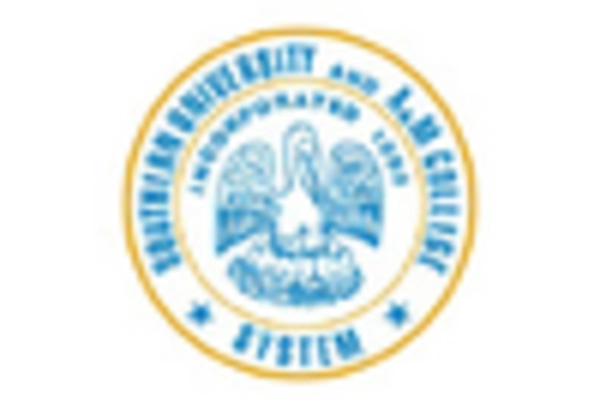Rise of Hybrid IT Environments
The server operating-system market in Argentina is witnessing a significant rise in hybrid IT environments, where organizations blend on-premises infrastructure with cloud solutions. This trend is largely driven by the need for flexibility and scalability in IT operations. Companies are increasingly adopting server operating systems that can seamlessly integrate with both traditional and cloud-based resources. The hybrid model allows businesses to optimize their workloads, enhance disaster recovery capabilities, and improve overall performance. As a result, the market is expected to grow by approximately 25% in the next few years, as organizations seek to leverage the benefits of hybrid IT. This shift not only transforms operational strategies but also influences the development of server operating systems tailored for hybrid environments.
Emergence of Edge Computing Solutions
The emergence of edge computing is reshaping the server operating-system market in Argentina. As organizations seek to process data closer to the source, the demand for server operating systems that support edge computing architectures is growing. This trend is driven by the need for real-time data processing and reduced latency, particularly in sectors such as manufacturing and telecommunications. Companies are increasingly investing in solutions that enable efficient data handling at the edge, which is projected to account for a significant portion of IT budgets in the coming years. The server operating-system market is likely to expand as businesses recognize the strategic advantages of edge computing, potentially leading to a market growth rate of 15% annually.
Growing Demand for Data Center Efficiency
The server operating-system market in Argentina is experiencing a notable shift towards enhancing data center efficiency. Organizations are increasingly seeking solutions that optimize resource utilization and reduce operational costs. This trend is driven by the need to manage rising energy expenses, which have surged by approximately 15% over the past year. As a result, companies are investing in advanced server operating systems that facilitate better load balancing and energy management. The focus on efficiency not only helps in cost reduction but also aligns with sustainability goals, as firms aim to minimize their carbon footprint. Consequently, the server operating-system market is likely to see a surge in demand for solutions that support virtualization and energy-efficient operations, indicating a robust growth trajectory in the coming years.
Regulatory Compliance and Data Sovereignty
In Argentina, the server operating-system market is significantly influenced by regulatory compliance and data sovereignty requirements. The government has implemented stringent data protection laws, compelling organizations to adopt server operating systems that ensure compliance with local regulations. This has led to an increased demand for systems that offer robust security features and data management capabilities. Companies are investing in solutions that not only meet legal standards but also enhance their operational resilience. The market is projected to grow as businesses prioritize compliance, with an estimated increase of 20% in investments towards compliant server operating systems over the next few years. This trend underscores the importance of aligning technology with regulatory frameworks, thereby driving innovation within the server operating-system market.
Increased Focus on Automation and Orchestration
Automation and orchestration are becoming pivotal in the server operating-system market in Argentina. Organizations are recognizing the need to streamline operations and reduce manual intervention, which can lead to errors and inefficiencies. The adoption of automated server operating systems is on the rise, as these solutions facilitate faster deployment, improved resource management, and enhanced operational agility. This trend is expected to drive market growth, with an anticipated increase of 30% in the adoption of automation technologies over the next few years. By leveraging automation, businesses can optimize their IT processes, reduce operational costs, and improve service delivery, thereby positioning themselves competitively in the evolving market landscape.
















